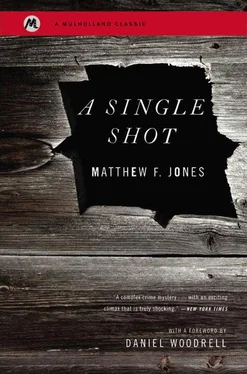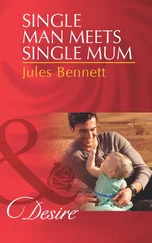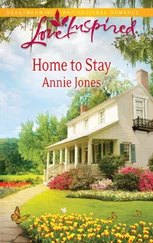Mincy laps at her coffee. “Or eensy beensy ’uns.”
Simon frowns sardonically. “I just got off a two-month bridge construction job up near Syracuse. This here’s my vacation. Ain’t that a pisser.”
John removes the shotgun’s bolt, stares down the barrel, sees tiny filaments lining the bore. He gets out his cleaning rod, cloth patches, and solvent. He starts cleaning the gun. The girl puts her head down on the table. She looks asleep. Simon throws out a cold cup of coffee and pours a fresh one. Rain loudly pummels the windows and trailer roof. Light slowly comes to the mountain.
“Ain’t this fun,” says Colette.
“Shut up,” says Simon.
“You ask me nihce.”
“Please don’t open your big fat mouth again until we’re back to town and you’re dropped off someplace I ain’t got to listen to it.” Simon finishes his coffee and stands up. He claps John on the back. “One day it just hits ya, Johnno,” he says. “I’m too old for this shit. Too fucking old.” He walks out the door. The two females get up and follow him. The girl walks into the doorframe on her way out, but doesn’t seem to feel it. She gazes over her shoulder at John, smiles dumbly, and wiggles the tips of her fingers at him.
A minute later, through rain-streaked glass, John watches the Cadillac slowly wind its way down the mountain.
The potent, wet smell of the woods affirms in his mind life’s cyclic nature. What is beaten down does or doesn’t sprout back up. Lingering dampness accentuates the forest’s darker colors—the greens, auburns, onyxes, browns. Brightness hides beneath a thin ground cover of mist. Bowing tree limbs, leaden with water, issue an eerie cacophony of protesting creaks and groans. The pulpy soil gives beneath him, each ground-sucking step confirming his live weight. The rain has abated to a slow drizzle. In the muggy air, beneath his waterproof poncho, he sweats profusely the alcohol he has consumed in recent days.
Just beyond the border of the preserve, from a wet swale of tangled goldenrod and dogbane, comes a pained mewl, like a baby’s cry. John looks into the swale and sees, pinned beneath a tree limb, a spring fawn with faded spots still on its coat. The limb is maybe six inches in circumference and has fallen from a white pine standing at one edge of the swale onto the left hindquarters of the deer.
At John’s approach the fawn thrashes so that he fears if its back or legs aren’t already broken they soon will be. Its round glistening eyes stare at death and, through the power and mystery of evolution, are terrified of the view. He wonders where its mother is. Another clueless enigma. To the fawn he talks soothingly as he is unable to do with his own son, though he is oblivious to the dichotomy. It’s likely crippled, thinks John, and if he frees it, with or without its mother, it will die slowly or fall prey to wild dogs or a bobcat. He ought to kill it and be on his way. Four days ago, he would have. Now, though, he fixates on its frantic stare and sees, beyond its trepidation, a nameless plea.
He lays down his shotgun, tosses aside his pack, and, to keep the fawn from thrashing, heavily places one hand on its steaming, rain-and perspiration-soaked chest, then runs the other back along its spine until he reaches the tree limb. He tries to lift the limb, but it’s too heavy for his one hand.
Still holding the deer, he sits down with his back against the swale’s edge and extends his legs until, with his knees slightly bent, his feet are against the limb. His head is so close to the deer’s that the latter’s warm breath, with its sharp, musky smell, dampens his cheek. Now the animal quits struggling as if understanding that John is there to help. John straightens his legs, then, pushing with his back, tries to move the limb. It edges forward a few inches, then stops. The deer groans. John pushes harder. The log rolls off the deer. For a few seconds the fawn lies there, failing to comprehend its good fortune. Then, trembling, it gets to its feet, glances once at John, and, without a noticeable limp, bounds up out of the swale and off through the woods. Listening to it go, John allows himself to think, “Might maybe make it, after all.”
Before he reaches the quarry road, on the near side of the abandoned pasture, he turns left and bushwhacks through a tangle of vines and brush that border the woods. On one of the sharp needles of a thorn-apple tree, blown there by the recent gale, a skewered purple finch twists. A three-legged fox plunges into the brush. There’s still no sign of the sun. The sky is the color of slate.
He enters a forest of virgin pine. Inside, it’s dark and steamy. John can’t see his feet for the mist. The canopy leaks water. Needles, cones, dislodged branches drop all around him. He stumbles into an elderberry thicket. Before finding his way out, he fills his hat with the sweet fruit. On the far side, he sits on a tree stump and eats what he’s picked. Perched overhead, a pair of grackles angrily squawk at him. He watches a pileated woodpecker drill for bugs in a rotten stump. Idly he wonders if, in these mountains, he might forever elude his pursuers. He knows he could survive. And what of his current life would he miss? His wife, who is trying to divorce him? His son, who cries at the sight of him? Yes. He would miss them both, but that would be all he would miss, and they might be better off without him.
Past the forest, he turns right again. Now several hundred yards beyond the quarry, he walks parallel to it. He crosses over a small stream, made bigger by the rain, then quickly skirts the outer edge of Quentin’s swamp, where the mosquitoes and black flies are thick, passes through an older stand of birch, oak, and elm, the last half-devoured by caterpillars, and emerges on the back side of the hill leading to the cliffs above the quarry. He walks along the spine of the wooded hill, undergrown with field grass, hawkweed, and patches of soft moss, until he reaches the quarry’s upper lip, where he lies down on his stomach between two mountain-laurel bushes, places the 12-gauge on the ground next to him, and through binoculars gazes a hundred feet down into the rock bowl.
Not exactly sure what he is looking for or how to react if he sees something unusual, he peers behind the bushes and into the crevices in the quarry walls. Everything looks the same as it did three days before, except the stone is water-stained, the plastic top of the lean-to sags beneath the recent rain, and John doesn’t remember if he left the pick and shovel lying, as they are now, in the entrance to the cave or standing next to it.
He lets the binoculars dangle from his neck and, delaying the inevitable for close to an hour, stares with his naked eyes into the quarry. He curses himself for being so stupid as to have left the body aboveground, even temporarily, with a slug from his gun in it and covered with his fingerprints. Then he remembers that when he should have buried the girl the thought felt like killing her all over again. Doing so now will be even harder, but he must. This time he’ll keep her photograph and personal items so that when she is lost to the rest of the world she won’t be to him. The money is a separate issue. It had been no more hers than John’s, Waylon’s, Obadiah Cornish’s, or whoever else might know of its existence. Despairingly John thinks again of Simon Breedlove showing up in the middle of the night, asking after Mutt, and of his feeling that morning that the trailer had been searched.
He walks the two hundred yards around the rim to the west edge of the bowl, where he stops and through the binoculars gazes down the mountain toward Hollenbachs’. The farm is hidden around a sharp bend a mile below, though John can see a short stretch of the rock-infested dirt road winding from there up to the quarry. He puts the binoculars away, then picks his way down the front side of the slope to where the cliff ends in less than a ten-foot drop near the quarry’s entrance. The road is puddled and muddy. Any tire tracks have been obliterated.
Читать дальше












